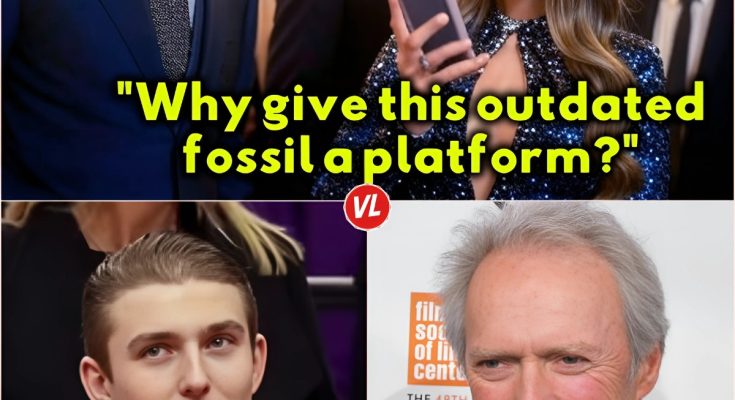It was an evening designed for glamour—a glittering charity gala nestled in the heart of New York City, where velvet curtains swayed beneath shimmering chandeliers and the clinking of crystal glasses punctuated the hum of polite conversation. Hollywood royalty mingled seamlessly with digital-era celebrities, creating a delicate balance between the past and the future. But unbeknownst to those present, the night was poised to deliver more than just extravagant gowns and generous donations; it would ignite a fierce cultural reckoning.
Amid the lavish display, standing calmly near a marble pillar, was Clint Eastwood. At ninety-three, the legendary actor-director’s presence still commanded silent reverence. His iconic features, etched by time and experience, radiated the quiet authority of someone who’d defined generations of storytelling. Clint wasn’t just attending; his presence symbolized a legacy crafted through grit, talent, and quiet courage.
Observing the room with equal quietude was Barron Trump, tall and contemplative at eighteen. He carried himself with a maturity far exceeding his years, a practiced observer who had learned to navigate public life thoughtfully and carefully. Dressed in a well-tailored navy suit, he seemed out of place amid the ostentatious display, his demeanor hinting at depths unseen by the casual observer.
Yet, the serene rhythm of the evening shattered abruptly when the influencer known as Vixen—platinum-haired, bold, and widely followed—raised her voice, live-streaming to millions of followers.
“Look who’s here tonight,” she sneered, her phone camera pointed unabashedly toward Clint Eastwood. “Talk about irrelevant. Honestly, does anyone even remember this guy?”
Her digital audience erupted in mocking agreement, emojis cascading like rain, emboldening her further. “Hey Clint, are you here to tell us how things were better back in the Wild West?”
The guests shifted awkwardly, sensing tension. Clint remained quiet, a faintly amused glint behind his steely gaze, unbothered by the social media theatrics.
Yet, before Vixen could relish her apparent triumph, a calm, authoritative voice interjected clearly:
Every eye swiveled toward Barron Trump, stepping forward steadily, his expression composed but firm. His voice—resonant, clear—commanded attention far beyond his eighteen years.
Vixen, sensing new prey, flashed a predatory smile and turned her camera toward him. “And look, it’s Barron Trump, defending yesterday’s news. Trying to save Grandpa Clint?”
Unperturbed, Barron met her challenge evenly. “The irony,” he began softly, “is you’re using technology and freedom of expression to belittle someone who fought for precisely that freedom—long before it was trending.”
A ripple of silence fell over the room. Barron continued:
“Do you realize the very platforms you rely upon exist because pioneers like Clint Eastwood challenged an outdated system? You mock his age, his legacy, but his stories—his films—aren’t outdated. They set standards you’re still trying to reach.”
Vixen’s confidence wavered slightly, but she recovered quickly, tossing her platinum waves defiantly. “You’re defending a man who represents an old, exclusive Hollywood—”
Barron raised a hand, not to silence her but to emphasize his point, his calmness even more compelling than any raised voice. “Exclusive? Clint Eastwood championed stories about diverse voices, underdogs, fighters—long before hashtags existed. He didn’t do it for likes; he did it because it mattered. That’s the legacy you casually dismiss.”
The live-stream comments changed rapidly, suddenly flooding with praise for the young man’s poised defense:
“Barron is speaking facts!”
“Respect to Eastwood—this kid knows!”
Vixen faltered visibly, her eyes darting nervously as the room shifted allegiance. “I—,” she stumbled.
Barron spoke again, gently yet firmly delivering the final blow: “If you truly want to be progressive, try building something meaningful instead of destroying what others have painstakingly built.”
The room erupted in spontaneous applause, smartphones capturing every moment of Barron’s composed rebuttal. Vixen stepped back, suddenly smaller under the weight of genuine insight.
Then, amid the renewed silence, Clint Eastwood himself stepped forward. His deep, gravelly voice resonated with a strength cultivated by decades on film sets. “Young lady,” he said, softly addressing Vixen, “the hardest role to play is yourself, especially when you’re still figuring out who that is. The easiest thing in the world is to mock. The hardest is to create something worth remembering.”
Vixen’s phone lowered slowly, her eyes widening with sudden realization.
Clint turned to Barron, nodding respectfully. “Thank you,” he said quietly. “But never let anyone convince you that you must defend a legacy that stands firmly on its own.”
And with quiet dignity, Clint withdrew into the shadows again, leaving the ballroom vibrating with awe.
The moment went viral. Videos titled “Barron Trump’s Powerful Defense of Clint Eastwood” amassed millions of views overnight. Hashtags like #RespectLegacy and #BarronSpeaksTruth trended widely, sparking earnest conversations across generations.
Meanwhile, Vixen retreated, her once-unshakable persona fractured. Her follower count dwindled swiftly, but beyond the public spectacle, she found herself reflecting deeply—questioning the very foundation upon which she’d built her identity.
Days later, in an unexpected move, she uploaded a video entirely stripped of her usual bravado. “I owe an apology to Clint Eastwood, Barron Trump, and everyone I misled,” she began earnestly. “My platform has immense reach, and I’ve used it poorly. I’m choosing to learn from this.”
The response was immediate and astonishingly forgiving, many acknowledging her courage in admitting mistakes publicly—a rarity in the world she’d inhabited.
Barron Trump, pressed by media for further comment, offered only simple wisdom: “We’re all growing. It takes strength to admit it.”
The saga ignited deeper dialogue on respect, humility, and how easily we discard the profound impact of previous generations. The youth embraced Barron’s dignified defense, prompting renewed interest in understanding the paths blazed by artists like Clint Eastwood, rather than dismissing them as outdated.
Quietly, Clint himself sent a handwritten note to Vixen—a single sentence: “It’s never too late to write your own story.”
She shared it publicly, tears streaming, captioned simply: “This is what humility looks like.”
The wave of responses crystallized into something unexpected: reconciliation, self-reflection, a shift toward genuine dialogue. Younger creators started revisiting classic films, recognizing the innovation behind each frame. Influencers posted about meaningful stories and collaborations, inspired by Barron’s eloquence and Clint’s grace.
Barron Trump retreated back into his quiet life, his momentary spotlight illuminating a powerful truth: genuine influence doesn’t shout; it resonates deeply, beyond surface noise.
Clint Eastwood, in characteristic silence, continued his life’s work, undisturbed by fleeting controversies. His quiet strength served as a beacon to a generation that had nearly forgotten the profound power of thoughtful creation.
And Vixen—now Vanessa—slowly rebuilt her voice, focusing on meaningful projects. She learned that influence isn’t about chasing trends but creating something worth remembering.
That glittering night in New York didn’t just become a viral moment; it ignited a movement of empathy, respect, and understanding. And though many voices contributed to the conversation, one young man’s words resonated most deeply:
“Respect isn’t outdated; it’s timeless.”




